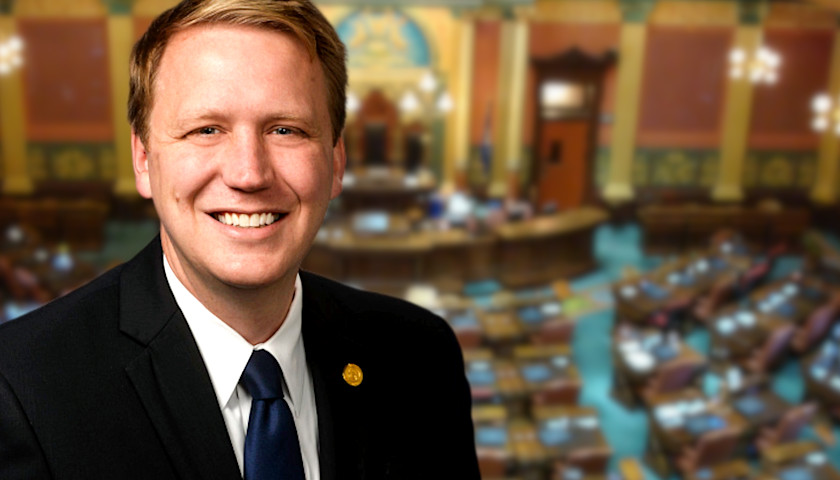by Tyler Arnold
The Michigan Senate on Tuesday passed legislation that would eliminate a mandate requiring all drivers to purchase unlimited, lifetime medical coverage in their insurance plan.
Senate Bill 1, sponsored by Sen. Aric Nesbitt, R-Lawton, passed on a vote of 24-14, receiving some bipartisan support but also Democratic dissent.
Supporters of the legislation say the lifetime medical mandate, which is unique to the state, is the main contributor to Michigan having the highest auto insurance costs in the country. Michigan motorists pay an average of $2,693 annually for auto insurance, which is nearly twice the national average of $1,470. Detroit drivers pay on average $5,464 per year, the highest rates in the country.
“We can all agree that Michigan drivers have the right to be upset,” Nesbitt said before the vote. “They want this problem solved.”
Nesbitt urged the Senate to vote in favor of the legislation to provide more choices for Michigan motorists, who would be able to choose plans that have the coverage they want for prices they can afford rather than being forced to subscribe to a one-size-fits-all insurance plan.
“We will have lower rates, provide choice, crack down on fraud and end lawsuit abuse,” Nesbitt said.
Two Democratic amendments passed with a bipartisan voice vote. One amendment would prohibit insurance companies from using gender as a basis for auto insurance rates and the other would prohibit insurance companies from denying coverage to someone based on where they live.
Dissenting votes mostly came as a result of two other Democratic legislative amendments that got shot down by the Senate in a party-line vote. One of the amendments would have mandated rate reduction and required insurance companies to receive state approval before raising rates. The other would have prohibited auto insurance companies from using non-driving factors as a basis for insurance rates.
Sen. Jeff Irwin, D-Ann Arbor, complained that the measure was rushed through the Senate and said it “utterly fails” because it does not mandate rate reduction or address the disproportionate costs faced by some people due to non-driving factors. He also said that eliminating the mandate will push the costs from car insurance companies to the taxpayer via Medicaid.
Countering the dissent, Sen. Ken Horn, R-Frankenmuth, argued that the legislation will save some drivers hundreds of dollars every year. Sen. Ed McBroom, R-Vulcan, said that some of his constituents in the upper peninsula have moved to Wisconsin to save money on car insurance.
Sen Adam Hollier, D-Detroit, who voted for all of the Democratic amendments, still voted for the final bill because he said that although he felt it was incomplete, it still makes progress. Hollier said many of his constituents will probably opt out of the unlimited, lifetime medical coverage to save money on their insurance.
The legislation will now go to the House, which has a Republican majority and where it also is expected to pass.
“Speaker Chatfield is glad they’re making progress,” Gideon DAssandro, a spokesperson for House Speaker Lee Chatfield, R-Levering, said in an email. “The House special committee is now 4 months in and has collected a lot of ideas and comments from the public. They will look at the Senate’s proposal and use those suggestions and others to build the best plan possible for Michigan families.”
Democratic Gov. Gretchen Whitmer has been an advocate for auto insurance reform, but her main focus has been on eliminating non-driving factors, such as a driver’s education level or occupation, that can lead to higher insurance rates for some. Last week, she ordered a report to be conducted by the Department of Insurance and Financial Services to outline solutions to this problem.
Michael Van Beek, the director of research for the Michigan-based Mackinac Center for Public Policy, said in a phone interview that the legislation addresses the largest problems that lead to the high auto insurance rates in Michigan. He said that this could provide relief for thousands of people.
Regarding the failed Democratic amendments, Van Beek said that they would not have provided an overall decrease in rates for Michiganders. Amendments to prevent non-driving factors from being considered for rates likely would have led to auto insurance companies raising rates on other motorists in the state to make up for the lost profits.
On the amendment to mandate a reduction in auto insurance rates, Van Beek said that this is not necessary because the increase in competition will lead to lower rates.
– – –
Tyler Arnold reports on Virginia, Ohio and Michigan for Watchdog.org. He previously worked for the Cause of Action Institute and has been published in Business Insider, USA TODAY College, National Review Online and the Washington Free Beacon.
Photo “Aric Nesbitt” by Concordmich. CC BY-SA 3.0. Background Photo “Michigan Capitol Chambers” by MittenStatePhototog. CC BY 2.0.




